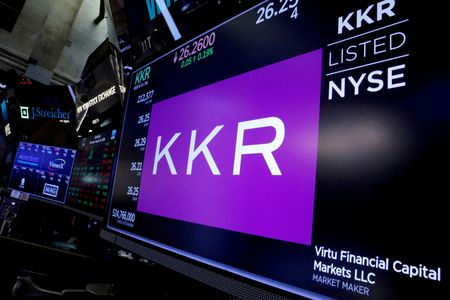 1
1 1
1
By Maiya Keidan
(Reuters) – Private equity firms should stay consistent in deploying capital even when facing a more challenging backdrop for dealmaking, KKR & Co’s co-head of global private equity, Pete Stavros, said on Tuesday.
The landscape is littered with people who try to call the market but no one is smart enough to do that, Stavros said at a Reuters Newsmaker event.
“I would say that is the mistake private equity investors have made in the last two years is that they have over-deployed into a hot M&A (mergers and acquisitions) market,” he said.
He added that while KKR does not maintain strict deployment rules, the firm tries to invest around 20% of the fund each year.
Private equity-backed deals totaled $278.6 billion in the first half 2023, a decrease of 49% from a year ago, and the slowest first half for private equity dealmaking since the first half of 2020, according to Refinitiv.
Stavros said KKR, which had $510 billion in assets as of the end of March, is benefitting from operating in an environment that is great for new investments.
He said that higher rates and more expensive leverage lead to constrained purchase prices.
“Buyers, and your competitors, tend to be a little more nervous, and you can generally find better opportunities.”
He pointed to recent deals in the U.S., including taking valve and pump maker Circor and chemical maker Chase private. KKR is set to make the purchases for $1.7 billion and $1.3 billion, respectively.
On collecting assets to invest in new opportunities, Stavros said while many investors in private equity firms feel a little over-allocated, they are aware that when markets are more volatile, that is the time to commit to the sector.
“Everyone knows, historically, these tend to be the more interesting times to commit to illiquid alternatives,” he said.
“If you look at historical periods of time where the S&P (500 index) was flat, private equity outperformed in the hundreds and hundreds of basis points.”
He said the next five years should be good vintages for private equity firms.
By contrast, the last two years of putting money in the ground in a very high-valuation, low-interest-rate environment probably may not turn out as well.
Despite the positive outlook for private equity, Stavros said KKR was “not making a ton of hires.”
Regarding geopolitical issues, Stavros said China remained “complicated” but that the firm continued to invest.
KKR thinks about risks for investors, he said.
Stavros’ nonprofit Ownership Works, which helps companies grant stock to entire workforces, is expanding.
“We’re working with labor unions and nonprofit foundations and pension funds, so we have like 100 organizations around the table trying to make this a more common model,” he said.
“I think this is how capitalism should work and is where we need to head.”
(Reporting by Maiya Keidan in Toronto; Editing by Matthew Lewis)